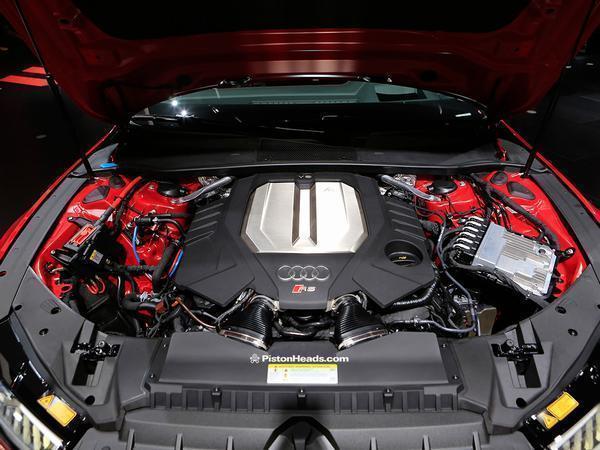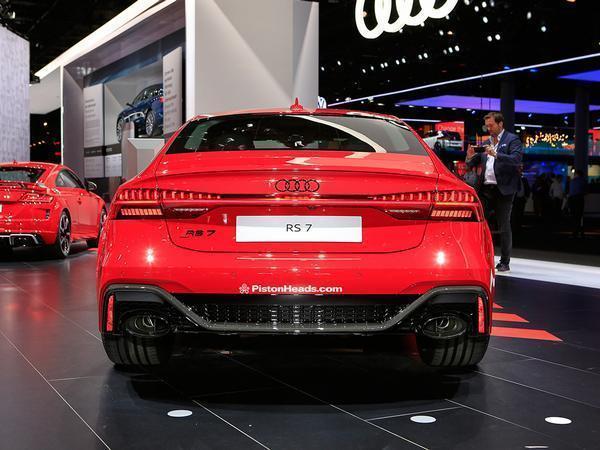Audi RS7 Sportback | Frankfurt 2019
All-new model gets 600hp mild hybrid V8 - and the wide-body arches it always needed

Audi has pulled the covers off its all-new RS7 Sportback ahead of the four-door model's launch in 2020. Mixing 4.0 TFSI power with a mild hybrid system, the RS7 has been given a quattro all-wheel drive system capable of sending up to 85 per cent of torque rearwards, a chassis with tracks 40mm wider than the A7 and air suspension offering a wider range of parameters. It's a setup that increases the size of gap to the regular A7 line-up and reinforces the RS-grade Sportback's position as a properly distinguished range-topper.
Significantly, the wide-arch-wearing RS7 arrives at the Frankfurt motor show only two months before BMW introduces its M8 Gran Coupe to the super-fast four-door segment, with the latter expected to receive the same rear-drive capable all-wheel drive system as the regular M8. The RS7's adjustable driveline could therefore be considered a direct response to its Bavarian competitor's new model; or, as evidenced by the growing number of Audis to promise playfulness, perhaps it comes as the most extreme example yet of Ingolstadt's slightly less blunt approach to chassis set up.
Either way, the RS7's headline attraction is claimed to be under the bonnet where Audi's 4.0-litre V8 is assisted by a now-familiar mild hybrid system, providing it with the torque filled upshifts and enhanced peak outputs. The RS7 Sportback puts both components to good use; 600hp and 590lb ft of torque are claimed for the car on paper, the latter arriving between 2,100-4,500rpm. Those figures propel the Sportback from 0-62mph in 3.6 seconds and, with the optional Dynamic Plus Pack deleting the factory-fit 155mph limiter, it'll hit 190mph.

Unsurprisingly, the 48v mild hybrid system also enhances efficiency, with the belt alternator starter recovering up to 12kW of power to feed into a lithium-ion battery for use in start/stop scenarios or to extend the engine's coasting abilities. Additionally, Audi's cylinder on demand tech works seamlessly in the background to save as much as 0.8 litres of fuel per 100 kilometres alone. Still, expect to find the MHEV hardware's torque-filling traits most satisfying; the motor maintains thrust in the milliseconds between upshifts in the RS7's eight-speed Tiptronic gearbox.
In normal driving scenarios, 60 per cent of torque is passed to the back axle via a mechanical centre differential, with the aforementioned 85 per cent peak only reached in certain circumstances. Audi puts it like this: "If one wheel slips, more drive torque automatically goes to the axle with the better traction", which suggests it's a balancing system rather than hooligan-minded response to BMW's oversteer happy rear-drive tech. But as PH found out in the S4 85 per cent of Ingolstadt-supplied torque can provide noticeable adjustability - even if only of Audi-sized proportions.
Elsewhere the manufacturer has given the model air suspension with new modules, enabling the RS7 to sit 20mm lower than the A7 at rest, be lowered by 10mm in its sportiest modes or, should you ask it to, raise to regular A7 heights. The suspension, which works with damping specific to the RS7, can be tuned with a maximum spring rate that's 50 per cent higher when the optional Dynamic Plus pack is specced. If you prefer things to be more permanently hunkered down, Audi's optional RS sport suspension and its Dynamic Ride Control aims to almost completely eliminate pitch and roll at pace - although it may prove counterproductive for the four-door on British B-roads; ditto swapping the standard 21-inch aluminium wheels for 22-inch alternatives. One to investigate next year.

PHers may wince at the standard fitment of progressive steering, but while its inclusion suggests we shouldn't expect much feedback through the rack with its infinitely variable strain wave gearing, it ought to at least give the RS7 quick responses at pace. For enhanced agility, Audi has carried over the A7's all-wheel steer system and prepared it for the 600hp application, though it remains an optional extra. More significantly, the button-selectable RS1 and RS2 modes introduced on the RS6 migrate, offering shortcut routes to optimising the chassis, powertrain and ESC settings. Finally, you've got perforated brake discs of 420mm/370mm diameters or optional ceramics of 440mm/370mm to gather it all up.
Cram that lot into a four-seater bodyshell with boot space to carry 535 litres of luggage (1,390 litres with the seats down), Audi's latest Virtual Cockpit wizardry and an exterior design that looks suspiciously superior to the RS6 Avant, and you've got a car potentially well placed to take the battle to BMW. Certainly, the mix of brutish V8 and MHEV hardware leaves the new RS7 Sportback looking broadly talented to a new buyer. Whether its enough to overcome the appeal of a rear-driven M8 Gran Coupe, we look forward to finding out.




















Gassing Station | General Gassing | Top of Page | What's New | My Stuff



